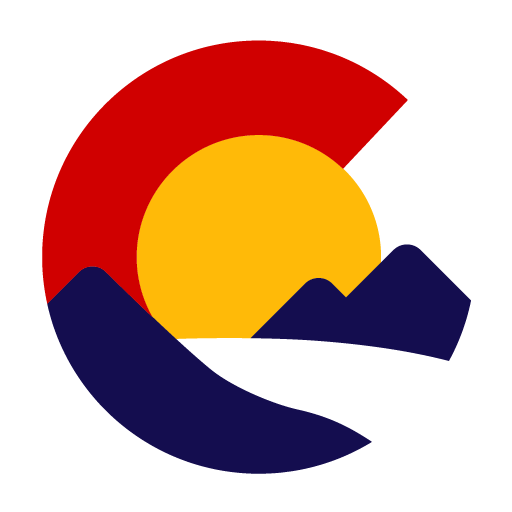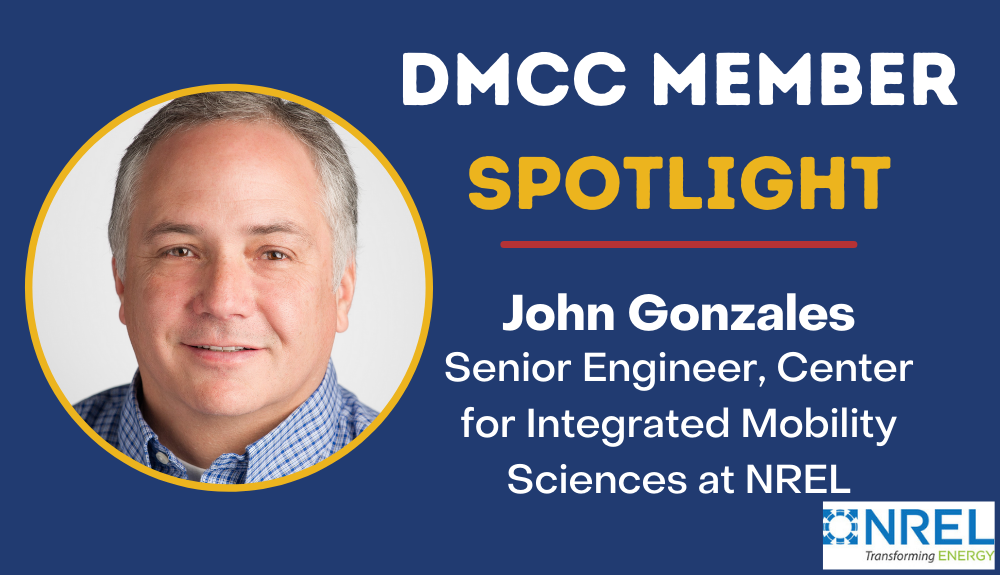The National Renewable Energy Laboratory (NREL) is a research facility focused on advancing the science and engineering of energy efficiency, sustainable transportation and renewable power technologies, and we are glad to have them as one of our members at DMCC. NREL’s vision is to transform the way we generate and consume energy by integrating sustainable solutions into today’s energy systems. John Gonzales, Senior Engineer in the Center for Integrated Mobility Sciences division of NREL and board member for DMCC, discussed with us his involvement with our organization and his responsibilities at NREL. Keep reading to dive deeper into NREL’s sustainable transportation goals, John’s work with the Tiger Teams Technical Assistance program, and his biggest takeaway from his engagement with DMCC.
Organization: National Renewable Energy Laboratory (NREL) 
Location: Golden, CO
*Note: These answers have been summarized from an interview with John Gonzales from NREL
You are a board member at DMCC, how did you get involved with the organization?
DMCC and I go back quite a long way. Back in the day, I worked with natural gas vehicles, and it was important for me, as an alternative fuel provider, to be a part of the coalition. DMCC was the second Clean Cities coalition to be formed – I started as an advisor for them and later became a board member. While I was involved with DMCC, there was a period where the coalition lost its legs and almost couldn’t stay afloat. During this time, I was working with the American Lung Association, and we were able to secure funding through the State Energy Program (SEP) grant to keep the organization alive. I served on the DMCC board from the early 2000s to 2010 and it was around this time that I transitioned to my job at NREL (National Renewable Energy Laboratory) and took a break from DMCC. That is, up until a few years ago when Bonnie, whom I had known for many years prior, became the executive director of DMCC and thought I would be a good fit for the board. Now I am happily serving on the coalition board once again and hope to use my insights from the lab to help further DMCC’s mission.
You lead and manage the Tiger Teams Technical Assistance program to help advance the use of alternative fuels and advanced vehicles, can you tell us a little more about that? What has been your favorite project with the program?
The main purpose of the program is to break down barriers and challenges. One of my roles is to help fleets when things aren’t working and figuring out if and how we can correct it. Sometimes we can’t, like if the manufacturer went out of business, but even with manufacturers that have gone out of business, we’ve managed to keep vehicles running for several years past what they otherwise would have. We also help fleets understand Clean Cities coalitions – a fleet might call NREL directly for help with an issue and in addition to assessing and fixing the problem, we put them in contact with a coalition, so the organization knows what’s going on and so the fleets understand who their advocate is in the alternative fuel space. Another aspect of the program is to advise others that are looking to start new program. This includes RFPs, what to look for when doing vehicle specs, and any other support to help fleets make a smart transition. As a former fuel salesman, I understand how important integrity is with vendors and I’ve kept that mindset through my work with NREL. I am open and honest with fleets about what challenges they might face and if we believe we can work through it.
I enjoyed the project I did out in Long Island, which was a refuse project for company that sold a CNG fuel system that went on a Navistar trash truck. The company went out of business and by the time we had been called to help, only a little over half of the vehicles were just barely working. We worked with the owners of the old company and some of their other suppliers as well as the EPA to get a variance on some things we were doing with the fleet. There were a lot of pieces of the puzzle to pull together, but we managed to keep the vehicles running for another 5 or 6 years.
What are NREL’s sustainability goals regarding clean transportation? How can DMCC support those?
We are the Renewable Energy Laboratory, and our management has a strong bend towards what that means. Right now, we are focused on electric vehicles., with the goal of transitioning to a completely alternative fuel powered fleet. All the work DMCC does now is a great advantage for what we hope to accomplish. We are probably not the first ones on your radar that need help, since helping others is what we do for a living, but the work you do with education on clean transportation helps us continue working with alternative fuel fleets and further reducing our climate impact.
What has been your favorite success story in the last year?
This is a great question – the first that comes to mind is survival. Most fleets have worked hard to have business as usual in this unusual world. They have continued to look at alt fuel projects even though they don’t have a firm grasp on their budgets. EVs have played a strong role in the discussion that I have had with fleets. School buses seem to be getting the lion’s share of those discussions. The work we are doing with STN (School Transportation News) and NAPT (National Association of Pupil Transportation) has been rewarding. We are educating school fleets around the country. Helping them to make wise decisions for their respective districts. Seeing how fleets have adapted and changed. Life will be a different normal for a while now. EVs will get more of the spotlight, that doesn’t mean that vehicles that use pistons to propel them won’t be as important, we just need to continue working to make them better. It is a broad portfolio; I fully believe all the fuels within it have a place. I look forward to those ongoing discussions.
What is your biggest takeaway from your engagement with DMCC?
I believe the biggest takeaway is the engagement and relationships that the coalition provides. The staff at DMCC are imperative to fostering relationships to support the organization and their stakeholders in their mission for cleaner air. At NREL, we want to continue building relationships with cities and fleets and thanks to DMCC, our web of connections just keeps growing. Having someone living and working full time down in Colorado Springs has been a great step for DMCC and will help bring credibility to the organization in that area. People in the Springs don’t have the same wants and needs as the Denver area, and it is important to customize help and advice to specific areas to make the most impact. DMCC’s influence is expanding to more people and places, strengthening the coalition and making them an even more invaluable resource.
See more DMCC Member Spotlights or learn more about joining DMCC today!



